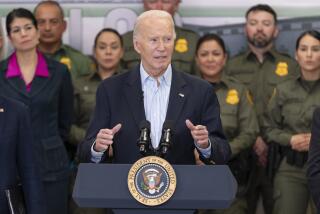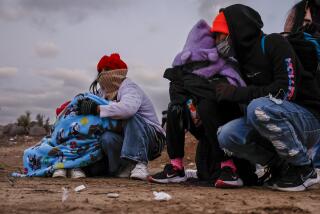Trump says Mexico is cracking down on migrants. There, it’s a different picture
If the Mexican government is cracking down on Central American migrants — as President Trump recently asserted — there was no evidence of it here in this remote town in southern Mexico.
Roughly 3,000 migrants, mostly arrivals on recent caravans, had found temporary quarters in a sun-baked sports complex, where residents scramble for shade beneath tents and rough lean-tos crafted from branches and palm fronds.
But they weren’t being detained or readied for deportation. Instead, they were being processed for permits that will facilitate travel north to the U.S. border.
“We want our children to have a future without fear of gangs,” said Oscar Amilcar, a Salvadoran hunkered down with his wife, two children and migrants from Guatemala and Honduras.
They all planned to resume their journeys soon and present themselves to U.S. border authorities to claim asylum.
It was a far different picture than the one Trump painted earlier this month when he announced he was holding off on his threat to shut the U.S.-Mexico border because Mexican authorities were “apprehending people now by the thousands and bringing them back to their countries.”
“Nobody’s ever seen anything like it,” he said during a visit to the California border city of Calexico.
Closing the border would have severe — and possibly disastrous — economic repercussions for the United States as well as Mexico, and Trump was facing pressure from across the political spectrum to rescind his threat. The purported increase in Mexican enforcement offered some political cover.
Except that it doesn’t seem to have occurred.
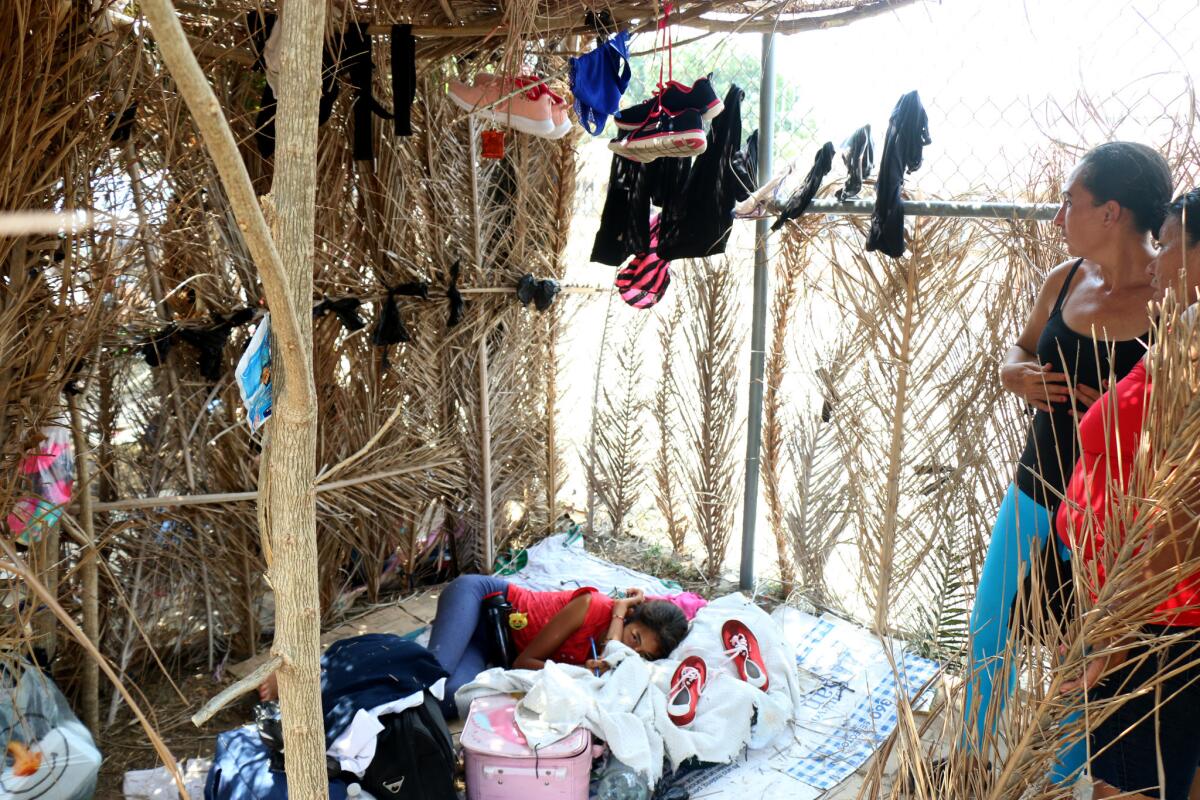
Mexico has no intention of engaging in mass deportations or moving to stop so-called migrant caravans, said Rocio Gonzalez Higuera, head of migration policy for the human rights branch of the country’s Interior Ministry.
“Mexico is implementing a process of orderly, regulated, secure migration, with respect for human rights,” Gonzalez said in an interview in Tapachula, a migrant hub just north of the Guatemalan border, when asked about Trump’s comments.
“What another country decides or says is the responsibility of that country, not ours,” Gonzalez said.
According to statistics published by the Mexican government, enforcement actions against migrants have actually slowed somewhat since President Andres Manuel Lopez Obrador took office in December.
Deportations were down 16% and arrests 7% for December, January and February compared with the same three-month period a year earlier. Figures for March were not yet available.
The reductions came amid decade-high numbers of Central American migrants making their way through Mexico to the United States.
“You have the number of Central Americans arriving increasing almost exponentially, but deportations remaining relatively stable,” said Stephanie Leutert, who heads the Mexico Security Initiative at the University of Texas at Austin.
Lopez Obrador made a campaign promise to respect the human rights of migrants, and his government has emphasized assisting them rather than criminalizing them — a posture that has even perturbed some people in Mexico fed up with the illicit migration.
To that end, it has issued skyrocketing numbers of “humanitarian” visas to northbound migrants.
In January and February, the government provided more than 19,000 such visas — almost one-third more than the total for all of 2018.
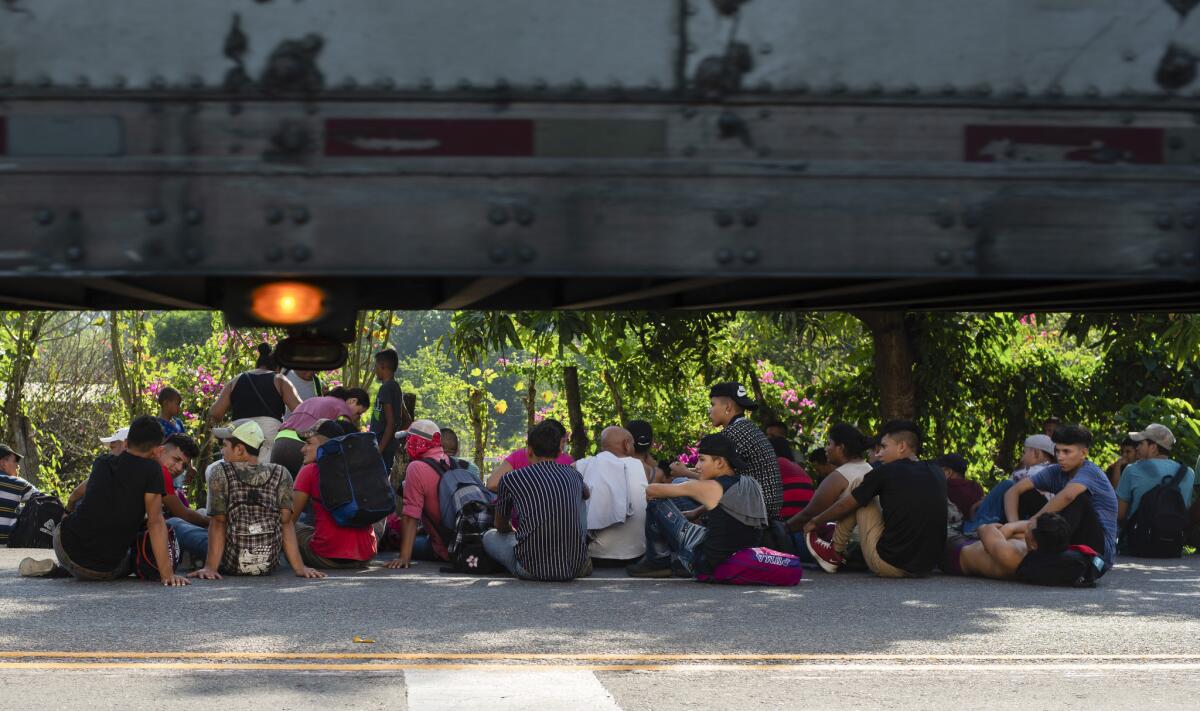
The visas allow migrants to cross Mexico to the U.S. border without fear of arrest, and without relying on expensive smugglers.
Soon, Mexican authorities say, Central Americans will be able to apply for the visas in their homelands.
Mexico is especially concerned about protecting the families with children who are increasingly dominating the movement north, said Gonzalez, the migration policy official.
Mexico has long been conflicted on the issue of immigration, and it has not been immune to U.S. pressure over the years.
Since 2015, according to official statistics, Mexico has deported more than 500,000 Central Americans, largely from the so-called Northern Triangle nations — Guatemala, Honduras and El Salvador — which are the biggest source of U.S.-bound migrants today.
Still, Mexico lacks the will, and manpower, to seal off its 700-plus-mile border with Guatemala, according to experts and officials.
Mexico’s official lexicon is that those detained and repatriated are “rescued” — terminology that reflects the sensitivity of the issue in a country where large numbers of its own citizens have been sent home from the United States against their will.
With Trump in power, the pressure on Mexico perhaps has never been greater.
Mexican policymakers seem caught between Lopez Obrador’s humanitarian inclinations and Trump’s demands for a crackdown.
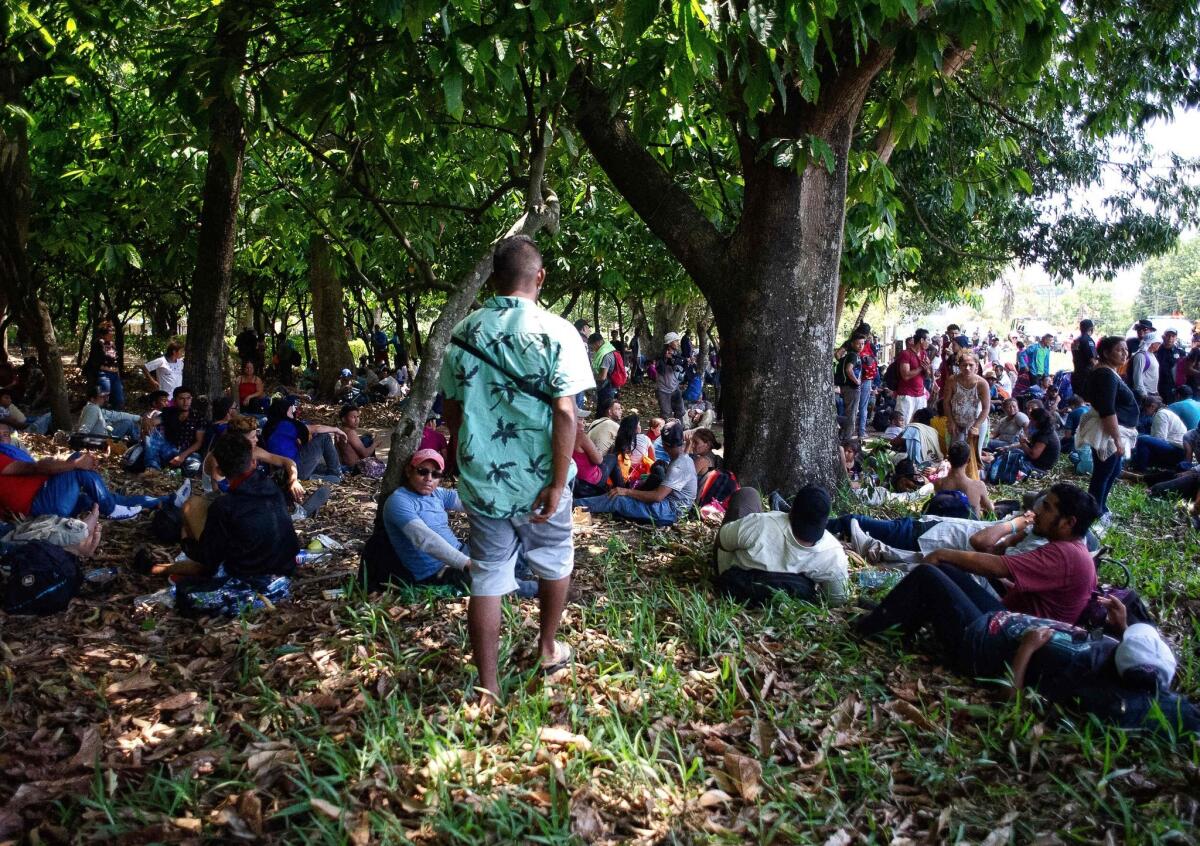
“Mexico will have to give guarantees to the White House that it is going to reinforce and harden its migratory policy and retake the control it has lost of the southern border,” columnist Salvador Garcia Soto wrote this month in Mexico’s El Universal newspaper on the eve of Trump’s visit to Calexico.
The main forces propelling the exodus from Central America — sluggish economies and rampant violence — are unlikely to change anytime soon.
“Mexico’s in a hard place because it can’t change U.S. immigration policy and it can’t change conditions in Central America,” Leutert said.
Then there are domestic pressures in Mexico.
Many Mexicans are showing increasing weariness with illegal immigration, grumbling that the government is helping Central Americans more than poor Mexicans.
More than half of respondents to a poll this month in El Universal agreed that the Mexican government should act to stop the flow of migrants.
Almost 60% said migrants were bad for their communities, compared with 34.2% who responded similarly to the same question in October, when the caravans were in the headlines here.
Some reports suggest that deep divisions have emerged within the government about whether to step up enforcement or allow more Central Americans to enter the country.
At the sports complex here in Mapastepec, in the Mexican state of Chiapas, 90 miles north of Guatemala, it was clear which side is winning out for the moment.
The migrants arrived at the facility after residents of the Mexican town of Huixtla — which welcomed caravan travelers last year — rejected their presence.
Now all were waiting to be processed for humanitarian visas allowing them to proceed.
Many were traveling with children. Word has spread to Central American nations that asylum applicants are more likely to be released in the United States if traveling in families.
“We have nothing to look forward to in Honduras,” said Deysi Marbeli Ibarra, 21, who held her 14-month-old daughter, Evangelina, on the edge of a soccer field.
She headed north in a caravan last month from Honduras with five other family members, including a sister and a niece.
Ibarra said her family ran a small business in her hometown of Danli, and that gangs were demanding weekly extortion payments and threatened her and her family if they did not pay.
Those threats would be the basis for her claim for political asylum in the United States, she said.
A few yards away, in one of the shaded lean-tos, Oscar Amilcar, 40, said he pulled up stakes last month in Ahuachapan, El Salvador, leaving with his wife and two children.
The eldest, 16-year-old Marlon, said he felt threatened because he refused to join a local gang.
“If you don’t join, they kill you and your family,” he said. “I don’t want that kind of life. I want to study and make myself better.”
Cecilia Sanchez in the Mexico City bureau contributed to this report.
Twitter: @PmcdonnellLAT
More to Read
Start your day right
Sign up for Essential California for news, features and recommendations from the L.A. Times and beyond in your inbox six days a week.
You may occasionally receive promotional content from the Los Angeles Times.

